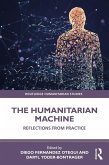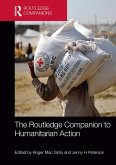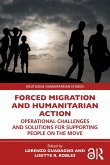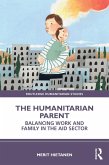The Humanitarian Machine (eBook, ePUB)
Reflections from Practice
Redaktion: Otegui, Diego Fernandez; Yoder-Bontrager, Daryl
35,95 €
35,95 €
inkl. MwSt.
Sofort per Download lieferbar

18 °P sammeln
35,95 €
Als Download kaufen

35,95 €
inkl. MwSt.
Sofort per Download lieferbar

18 °P sammeln
Jetzt verschenken
Alle Infos zum eBook verschenken
35,95 €
inkl. MwSt.
Sofort per Download lieferbar
Alle Infos zum eBook verschenken

18 °P sammeln
The Humanitarian Machine (eBook, ePUB)
Reflections from Practice
Redaktion: Otegui, Diego Fernandez; Yoder-Bontrager, Daryl
- Format: ePub
- Merkliste
- Auf die Merkliste
- Bewerten Bewerten
- Teilen
- Produkt teilen
- Produkterinnerung
- Produkterinnerung

Bitte loggen Sie sich zunächst in Ihr Kundenkonto ein oder registrieren Sie sich bei
bücher.de, um das eBook-Abo tolino select nutzen zu können.
Hier können Sie sich einloggen
Hier können Sie sich einloggen
Sie sind bereits eingeloggt. Klicken Sie auf 2. tolino select Abo, um fortzufahren.

Bitte loggen Sie sich zunächst in Ihr Kundenkonto ein oder registrieren Sie sich bei bücher.de, um das eBook-Abo tolino select nutzen zu können.
In The Humanitarian Machine aid workers reflect on their own experiences of working in crisis. As they write about their work and the ways in which they each approach the challenges of helping people, they comment on some of the most vexing issues facing the humanitarian sector.
- Geräte: eReader
- ohne Kopierschutz
- eBook Hilfe
- Größe: 20.31MB
Andere Kunden interessierten sich auch für
![The Humanitarian Machine (eBook, PDF) The Humanitarian Machine (eBook, PDF)]() The Humanitarian Machine (eBook, PDF)35,95 €
The Humanitarian Machine (eBook, PDF)35,95 €![The Routledge Companion to Humanitarian Action (eBook, ePUB) The Routledge Companion to Humanitarian Action (eBook, ePUB)]() Roger Mac GintyThe Routledge Companion to Humanitarian Action (eBook, ePUB)46,95 €
Roger Mac GintyThe Routledge Companion to Humanitarian Action (eBook, ePUB)46,95 €![Depoliticising Humanitarian Action (eBook, ePUB) Depoliticising Humanitarian Action (eBook, ePUB)]() Depoliticising Humanitarian Action (eBook, ePUB)40,95 €
Depoliticising Humanitarian Action (eBook, ePUB)40,95 €![Working in International Development and Humanitarian Assistance (eBook, ePUB) Working in International Development and Humanitarian Assistance (eBook, ePUB)]() Maia GeddeWorking in International Development and Humanitarian Assistance (eBook, ePUB)47,95 €
Maia GeddeWorking in International Development and Humanitarian Assistance (eBook, ePUB)47,95 €![Forced Migration and Humanitarian Action (eBook, ePUB) Forced Migration and Humanitarian Action (eBook, ePUB)]() Forced Migration and Humanitarian Action (eBook, ePUB)41,95 €
Forced Migration and Humanitarian Action (eBook, ePUB)41,95 €![The Humanitarian Parent (eBook, ePUB) The Humanitarian Parent (eBook, ePUB)]() Merit HietanenThe Humanitarian Parent (eBook, ePUB)37,95 €
Merit HietanenThe Humanitarian Parent (eBook, ePUB)37,95 €![The Routledge International Handbook of Critical Philanthropy and Humanitarianism (eBook, ePUB) The Routledge International Handbook of Critical Philanthropy and Humanitarianism (eBook, ePUB)]() The Routledge International Handbook of Critical Philanthropy and Humanitarianism (eBook, ePUB)45,95 €
The Routledge International Handbook of Critical Philanthropy and Humanitarianism (eBook, ePUB)45,95 €-
-
-
In The Humanitarian Machine aid workers reflect on their own experiences of working in crisis. As they write about their work and the ways in which they each approach the challenges of helping people, they comment on some of the most vexing issues facing the humanitarian sector.
Dieser Download kann aus rechtlichen Gründen nur mit Rechnungsadresse in A, B, BG, CY, CZ, D, DK, EW, E, FIN, F, GR, HR, H, IRL, I, LT, L, LR, M, NL, PL, P, R, S, SLO, SK ausgeliefert werden.
Produktdetails
- Produktdetails
- Verlag: Taylor & Francis eBooks
- Seitenzahl: 234
- Erscheinungstermin: 6. Juli 2021
- Englisch
- ISBN-13: 9781000402094
- Artikelnr.: 61776133
- Verlag: Taylor & Francis eBooks
- Seitenzahl: 234
- Erscheinungstermin: 6. Juli 2021
- Englisch
- ISBN-13: 9781000402094
- Artikelnr.: 61776133
- Herstellerkennzeichnung Die Herstellerinformationen sind derzeit nicht verfügbar.
Diego Fernandez Otegui has almost 25 years of experience in emergency management and humanitarian affairs, working in East Timor, the Democratic Republic of Congo, India, Mozambique, Trinidad and Tobago, and Spain. He is a board member of the International Humanitarian Studies Association (IHSA) and Representative in the United States of the University Network of the Americas for Disaster Risk Reduction (REDULAC) and has a PhD in Disaster Science and Management at the University of Delaware, USA. Daryl Yoder-Bontrager has worked for over 20 years in humanitarian assistance and community development with Mennonite Central Committee, ultimately becoming Director of its Latin America and Caribbean programs and helping to lead the organization's responses to Hurricane Mitch in Central America and the 2010 Haiti earthquake as well as countless smaller disasters in the region. He holds a PhD in Disaster Science and Management at the University of Delaware, USA.
Preface Introduction Section 1. Flexibility and Standardization: Standards
in Humanitarian Delivery Introduction to the conversation 1. How Standards
Contribute to the Humanitarian Sector (Aninia Nadig) 2. FAO Goats Don't
Die: Can Evaluations Make Aid More Inclusive? (Marta Bruno) 3. COVID and
Cholera: Reflections on Humanitarian Principles and their Impact on Public
Health Emergencies (David Eisenbaum) 4. How to Be Relevant: A Personal
Journey in the Aid System (Volker Huls) 5. Flexibility in Fragility (Helen
Barclay-Hollands) Extending the conversation Section 2. Freedom and
Control: The Mechanisms of Humanitarian Delivery Introduction to the
conversation 7. A Behind the Desk View of Responding to a Disaster (Marie
Anne Sliwinski) 8. Ensuring Shared Best Practices are in Place (Gary Shaye)
9. Connecting both Ends and Completing the Humanitarian Cycle: Engaging
Donors in a European Context (Naomi Enns) 10. The Role of Volunteers (Jono
Anzalone) 11. Action learning in the Anthropocene (Pat Foley) Extending the
conversation Section 3. Culture and Power: The Value of Humanitarian
Interventions Introduction to the conversation 11. Invisible to Systems,
Invisible to Help (Kendra Pospychalla) 13. Security Management: Local
Responsibility, Local Engagement (Andrew Cunningham) 14. Starting from
Within (Rami Shamma) 15. The Politics of Genocide Prevention and the Limits
of Humanitarian Neutrality (Matthew Levinger) 16. Between coordination and
communities: Navigating competing perspectives after Hurricane Matthew in
Haiti (2016-2019) (Paul Shelter Fast) Extending the conversation Conclusion
in Humanitarian Delivery Introduction to the conversation 1. How Standards
Contribute to the Humanitarian Sector (Aninia Nadig) 2. FAO Goats Don't
Die: Can Evaluations Make Aid More Inclusive? (Marta Bruno) 3. COVID and
Cholera: Reflections on Humanitarian Principles and their Impact on Public
Health Emergencies (David Eisenbaum) 4. How to Be Relevant: A Personal
Journey in the Aid System (Volker Huls) 5. Flexibility in Fragility (Helen
Barclay-Hollands) Extending the conversation Section 2. Freedom and
Control: The Mechanisms of Humanitarian Delivery Introduction to the
conversation 7. A Behind the Desk View of Responding to a Disaster (Marie
Anne Sliwinski) 8. Ensuring Shared Best Practices are in Place (Gary Shaye)
9. Connecting both Ends and Completing the Humanitarian Cycle: Engaging
Donors in a European Context (Naomi Enns) 10. The Role of Volunteers (Jono
Anzalone) 11. Action learning in the Anthropocene (Pat Foley) Extending the
conversation Section 3. Culture and Power: The Value of Humanitarian
Interventions Introduction to the conversation 11. Invisible to Systems,
Invisible to Help (Kendra Pospychalla) 13. Security Management: Local
Responsibility, Local Engagement (Andrew Cunningham) 14. Starting from
Within (Rami Shamma) 15. The Politics of Genocide Prevention and the Limits
of Humanitarian Neutrality (Matthew Levinger) 16. Between coordination and
communities: Navigating competing perspectives after Hurricane Matthew in
Haiti (2016-2019) (Paul Shelter Fast) Extending the conversation Conclusion
Preface Introduction Section 1. Flexibility and Standardization: Standards
in Humanitarian Delivery Introduction to the conversation 1. How Standards
Contribute to the Humanitarian Sector (Aninia Nadig) 2. FAO Goats Don't
Die: Can Evaluations Make Aid More Inclusive? (Marta Bruno) 3. COVID and
Cholera: Reflections on Humanitarian Principles and their Impact on Public
Health Emergencies (David Eisenbaum) 4. How to Be Relevant: A Personal
Journey in the Aid System (Volker Huls) 5. Flexibility in Fragility (Helen
Barclay-Hollands) Extending the conversation Section 2. Freedom and
Control: The Mechanisms of Humanitarian Delivery Introduction to the
conversation 7. A Behind the Desk View of Responding to a Disaster (Marie
Anne Sliwinski) 8. Ensuring Shared Best Practices are in Place (Gary Shaye)
9. Connecting both Ends and Completing the Humanitarian Cycle: Engaging
Donors in a European Context (Naomi Enns) 10. The Role of Volunteers (Jono
Anzalone) 11. Action learning in the Anthropocene (Pat Foley) Extending the
conversation Section 3. Culture and Power: The Value of Humanitarian
Interventions Introduction to the conversation 11. Invisible to Systems,
Invisible to Help (Kendra Pospychalla) 13. Security Management: Local
Responsibility, Local Engagement (Andrew Cunningham) 14. Starting from
Within (Rami Shamma) 15. The Politics of Genocide Prevention and the Limits
of Humanitarian Neutrality (Matthew Levinger) 16. Between coordination and
communities: Navigating competing perspectives after Hurricane Matthew in
Haiti (2016-2019) (Paul Shelter Fast) Extending the conversation Conclusion
in Humanitarian Delivery Introduction to the conversation 1. How Standards
Contribute to the Humanitarian Sector (Aninia Nadig) 2. FAO Goats Don't
Die: Can Evaluations Make Aid More Inclusive? (Marta Bruno) 3. COVID and
Cholera: Reflections on Humanitarian Principles and their Impact on Public
Health Emergencies (David Eisenbaum) 4. How to Be Relevant: A Personal
Journey in the Aid System (Volker Huls) 5. Flexibility in Fragility (Helen
Barclay-Hollands) Extending the conversation Section 2. Freedom and
Control: The Mechanisms of Humanitarian Delivery Introduction to the
conversation 7. A Behind the Desk View of Responding to a Disaster (Marie
Anne Sliwinski) 8. Ensuring Shared Best Practices are in Place (Gary Shaye)
9. Connecting both Ends and Completing the Humanitarian Cycle: Engaging
Donors in a European Context (Naomi Enns) 10. The Role of Volunteers (Jono
Anzalone) 11. Action learning in the Anthropocene (Pat Foley) Extending the
conversation Section 3. Culture and Power: The Value of Humanitarian
Interventions Introduction to the conversation 11. Invisible to Systems,
Invisible to Help (Kendra Pospychalla) 13. Security Management: Local
Responsibility, Local Engagement (Andrew Cunningham) 14. Starting from
Within (Rami Shamma) 15. The Politics of Genocide Prevention and the Limits
of Humanitarian Neutrality (Matthew Levinger) 16. Between coordination and
communities: Navigating competing perspectives after Hurricane Matthew in
Haiti (2016-2019) (Paul Shelter Fast) Extending the conversation Conclusion







